In August 2020 a letter fell on 10.000 doormats throughout Budapest. Probably everyone who opened the envelope was surprised: the city council asked the reader for help. And not just on a minor issue. Would the reader help the city of Budapest to develop a strategy to tackle climate change? If they would, they could sign up to take part in the Climate Citizens’ Assembly that was to take place in the fall. Most of them were not only surprised, they were also hesitant: “Why me? What do I know about climate change? I’m no expert.” The letter explained that they really didn’t have to be an expert, that the city council was interested in their personal views and that they would receive any support needed to take part in the citizens’ assembly. In the end 333 people signed up. “I consider that a massive success,” says Éva Bördős, director of the NGO DemNet, which was one of the civil society organizations responsible for organising the assembly.
This interview is part of the international project Climate Citizens’ Assemblies: learning with, from and for Europe, initiated by Bureau Burgerberaad and Pakhuis de Zwijger, together with Extinction Rebellion NL and De Transitiemotor. Via various in-depth interviews, European keyplayers share practices, reflections and personal experiences with Climate Citizens’ Assemblies.
Why do you consider 333 registrations a massive succes?
“The response rate is usually between 3-5%, and considering the fact that people received the invitation in the middle of the summer and in the middle of a pandemic… That really is a successful outcome”, Evá says. “It was nice to see how many people who were not invited also reacted. We had launched a media campaign that summer to raise awareness around the upcoming Climate Citizens’ Assembly: apparently this struck a chord in Budapest, because we received dozens of phone calls from people asking if they could participate in the process. So we had to explain that unless they received an invitation they could not take part. It showed there was genuine public interest in the citizens’ assembly.”
So, what is DemNet and what role did it play in the Budapest Citizens’ Assembly?
DemNet is a medium sized grassroots organisation and NGO, established in 1996. From the beginning one of their aims was to boost active citizenship and to promote cross-sectoral dialogue. As a result of an EU-funded project coordinated by WeMove, and inspired by examples in Ireland and Poland, DemNet started focussing on Citizens’ Assemblies. “We wanted to dive deeper into the concept of deliberative democracy and citizens’ assemblies,” Evá explains, “so we started our own research. Parallel to that, independent researchers and civil society activists were doing the same, so we joined forces. Thankfully, our donors were willing to fund the initiative, which suddenly made our plans realistic. The timing was perfect; the local elections of October 2019 had given Budapest a progressive, open minded mayor, Gergely Karácsony, who takes participatory democracy quite seriously. During his campaign he had already talked about the importance of involving citizens’ into decision making, so to us it seemed natural to initially try to see how the concept works in practice at the local level.”
At the beginning of the process, a stakeholder meeting was organized.“The purpose of this meeting was twofold”, says Bördős, “to try to narrow the topic down, and to hear what these stakeholders considered important with regards to city life and the climate. It was clear from the start that the general topic would be climate change, but the input of the stakeholders helped identifying the question on which members of the citizens’ assembly would later deliberate.
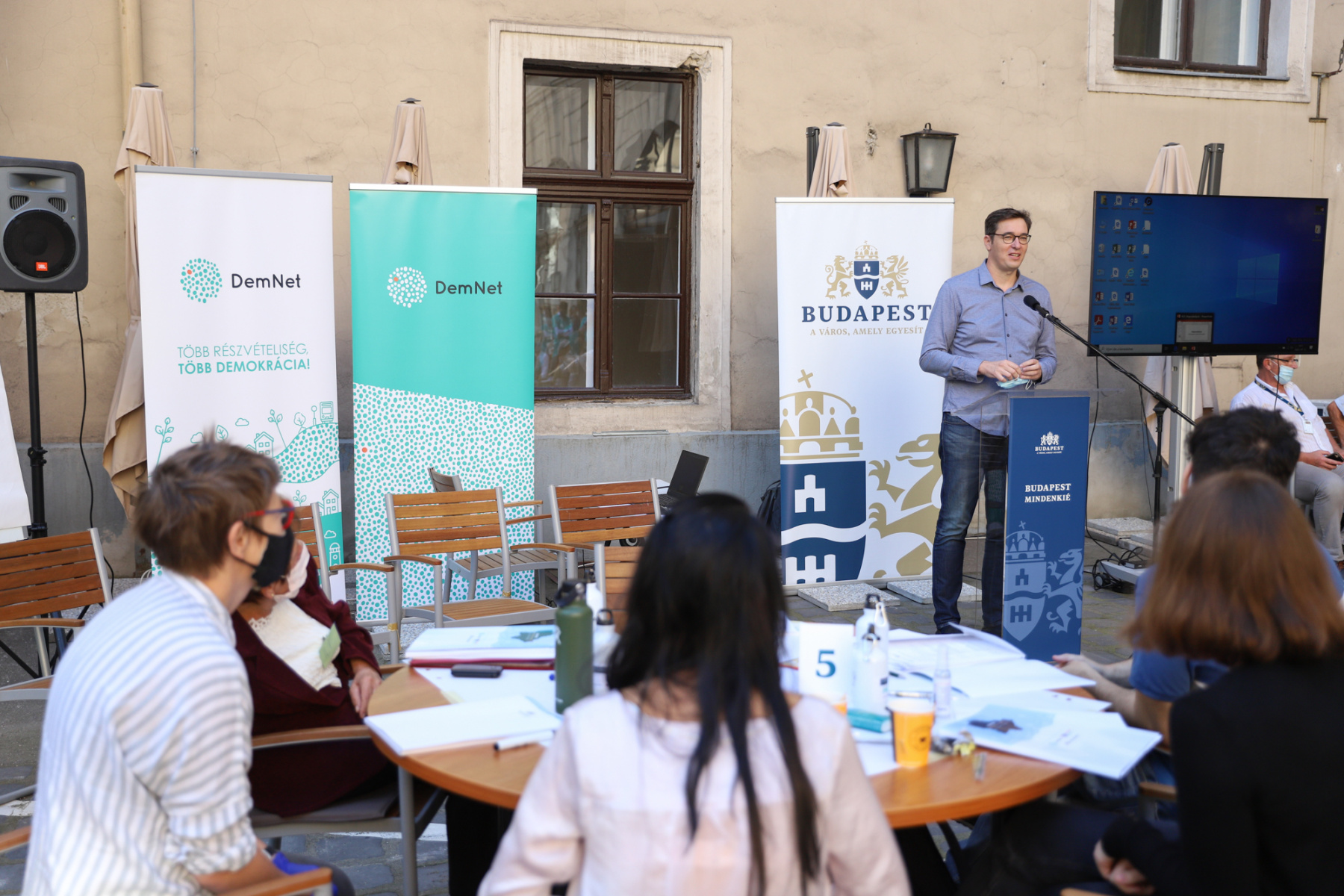
© Ildiko Fulop / DemNet Hungary. On the picture: Gergely Karacsony, Mayor of Budapest, opening the Assembly.
Those seem to be perfect circumstances; were there any difficulties as well?
Bördős responds with a smile: “The cooperation, funding and the willingness of the mayor were of course of vital importance, but organising the Climate Assembly still proved to be challenging. We were between two waves of the covid pandemic. Also, we started the recruitment process in August, and were a bit worried initially if it would generate enough interest. Luckily, the project received media attention, which also helped us reach a wide enough audience.
Although I am very proud of the outcomes and the quality of the Budapest Climate Assembly, the limited time we had was a shortcoming. Two weekends were absolutely not enough, especially since the topic, after all, remained a bit too broad. Everything had to be done in those two weekends: the learning phase, the deliberation, and the decision making. That’s why my suggestion to anyone preparing to organise such an event is to take more time, especially when the topic is complex.”
Make sure there is enough time for the whole process, especially when the topic is complex.
What kind of people took part and were they all concerned about climate change?
“Out of the 333 people who responded to the invitation, 50 were selected to actually take part in the assembly. To make sure those fifty people represented the Budapest population several elements were taken into the stratification: age, gender, level of education, and the various districts of the city.
What I loved to see was the snowball effect that took place. One participant for instance posted a message in her neighbourhood FB-group. She told her neighbours that she had been selected, what topics the assembly was discussing and asked them what their opinion was? That way she felt she could channel the views of her community as well and enable many more voices to take part in the conversation.
Many of the participants said they were very sceptical in the beginning about the whole process. I completely understand, because having an open and honest dialogue is what we lack in Hungary these days. Fortunately the Assembly proved to them that such a thing was indeed possible. For instance, there was a man who on the first day said: ‘I promised my family that I won’t continue if it turns out to be pointless. My weekends are precious, because that’s the only time I have with my family, so I am not going to spend it on something meaningless.’ But the next weekend he came back. He had told his family: ‘Me not going back to the assembly? That is not going to happen.’”
And there is another example Bördős wants to share: “There was a lady who said on the first morning: ‘I have a car and there is absolutely no way I am going to ditch it. It’s the most convenient mode of transport.’ At the end of the first weekend she said: ‘Maybe I should use my car less.’ And then when she came back for the second weekend, she said: ‘Guess what, I bought an electric bicycle!’ All in the span of two weekends! That is really what a deliberative process is about. When people with different backgrounds, different ways of thinking talk to each other, it can change attitudes. That is a wonderful thing. Of course, Citizens’ Assemblies have a more ambitious aim: exchanging views and democratising decision making in general, not just changing the attitude of 50 or 100 people in the assembly. It is a tool for a bigger, more systemic change. Citizens’ assemblies are what we need for sustainable development and for a peaceful society.”
The selection of participants is usually based on age, gender, level of education and geography. In the case of Climate Citizens’ Assemblies, do you think it’s wise to ask people about their attitude towards the topic as well? The level of their concern for instance?
The point of a citizens’ assembly is to gather people with different viewpoints and backgrounds. Therefore, citizens’ assemblies not only use random selection, but also stratified random selection. This is already a good starting point for a broad range of perspectives to be included in the dialogue. But it really depends on the topic whether it’s necessary or at all useful to include an attitude question as well. If it’s a polarising topic, like abortion in Ireland, or Brexit in the UK, obviously, you simply have to have an attitude question in the recruitment notice. Otherwise, I think you have to decide on a case-by-case basis. We decided not to include one, as we judged the question of the Budapest assembly too broad and complex. But even though we didn’t include an attitude question, there were differing voices. Which makes sense, since the participants were a fair representation of the population of Budapest, so it was statistically probable for the attitudes of the participants to be divergent as well.
For a few seconds Bördős pauzes. Then she adds: “To get a fair representation of society, I think there is another important thing: many of the people who were selected had not even considered signing up initially, because they thought they didn’t know enough about climate change. This is problematic because you want all the voices of society, not just the people with specific knowledge or a strong opinion on the subject. Of course, we explained this in the invitation, which included an elaborate Q&A, but still, you need to communicate this throughout the recruitment period. So every time we talked about the assembly, we emphasized: “Don’t be discouraged, you don’t need to have any expert knowledge, just register and you will get everything you need to participate and make decisions.” I think this can’t be emphasized enough: make sure people understand that it’s their views that matter, not the level of their knowledge on the topic.”
Make sure people understand that it’s their views that matter, not their knowledge of the topic.
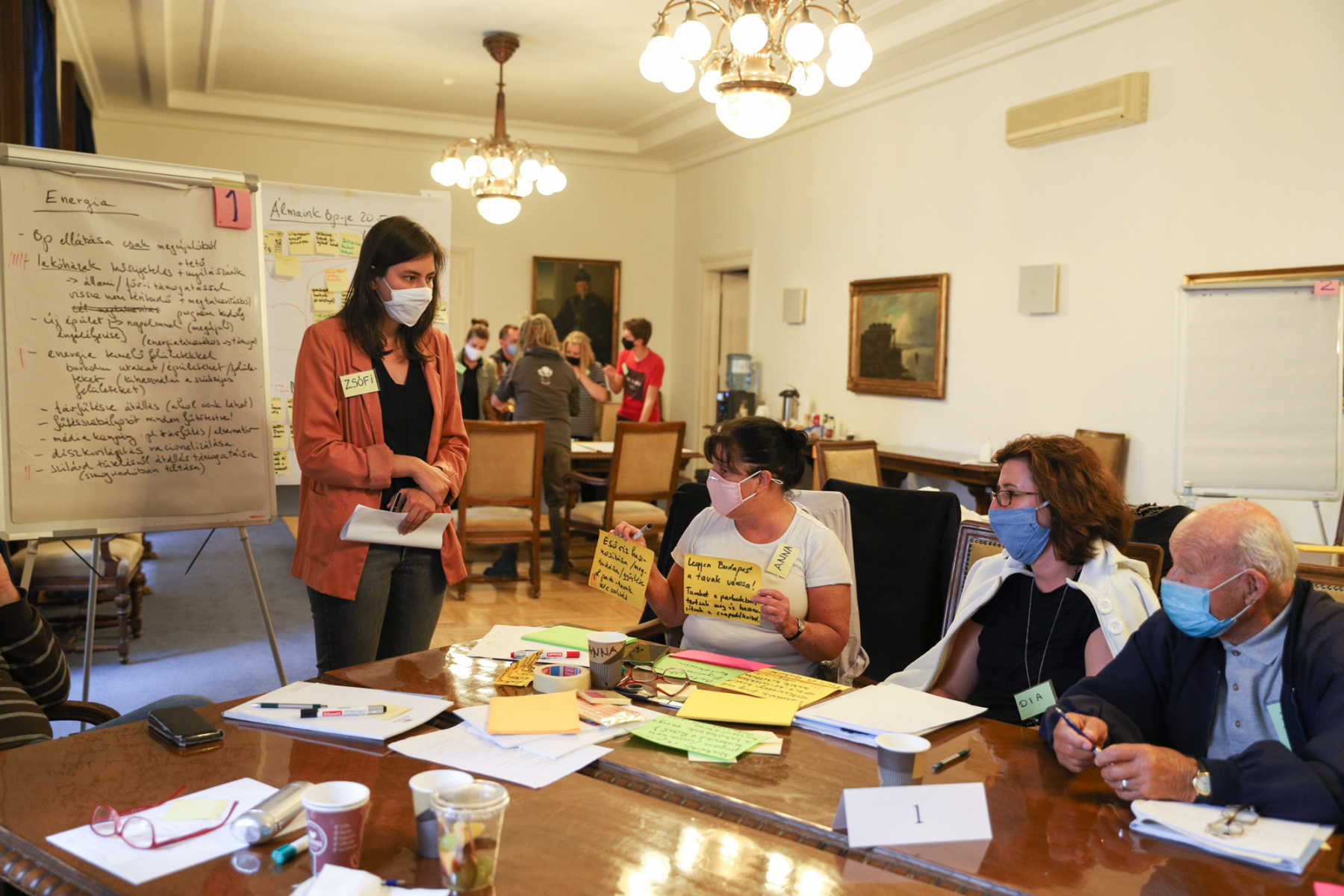
© Ildiko Fulop / DemNet Hungary. On the picture: assembly members making recommendations.
How did you make sure that the recommendations received political follow up?
“There were different levels of commitment. The city council and the mayor himself personally, agreed that they would publicly react to the list of recommendations. They also committed to incorporating the recommendations into the climate strategy of the city, on which the city council would vote later. The city’s climate strategy was eventually adopted in February 2021 and what we see is that the recommendations of the assembly are indeed more or less reflected in the document. On our site we analyzed the extent to which the recommendations were followed. There are some recommendations that were not entirely adopted, but we hope that the city council and the mayor will find a way to act on those recommendations as well.
Also, the climate strategy is a long term strategy, so we have to wait to see how it is acted upon. We plan to evaluate the progress in a year, analyse the reports that the city will publish, and do a qualitative analysis to see what has been realised and what has yet to be done.”
Melinda Varfi, a colleague of Éva Bördős at DemNet, and one of the lead facilitators of the Budapest assembly, adds: “Even though we had a lot of support on the municipal level, we did not manage to get a mandate from the top. The climate strategy that the city of Budapest has adopted incorporates quite a few – if not all – recommendations, but it does so by saying: ‘Recommendation number 7: citizens want to create co2-reduction in this particular way’ and not ‘Recommendation number 7 is going to be executed in this particular way’. It really is a strategic document. The crux is that some recommendations were so expensive that the municipality cannot afford them. For example ‘renewable energy for every citizen’, which demands subsidies for citizens, as they cannot afford it themselves. The municipality does not have this money, and has to ask the central government for it. This is where politics come in.
What happened in this past year is that the central government has been opposing all the municipal plans and jeopardizing ways to get financial support. For example, they have been cutting municipal income revenue under the banner of COVID saying, ‘Because of covid no one has to pay parking fees anymore’, while parking fees are a revenue to the municipality and the city. This way the national government has cut back financial support. Even though the municipality really wants to support sustainable change, the politicians are also quite careful. They cannot make a promise if they can’t live up to it. That is why it is challenging to give a mandate, to say ‘this is going to happen’. Unfortunately, the conditions are not yet ready for it.”
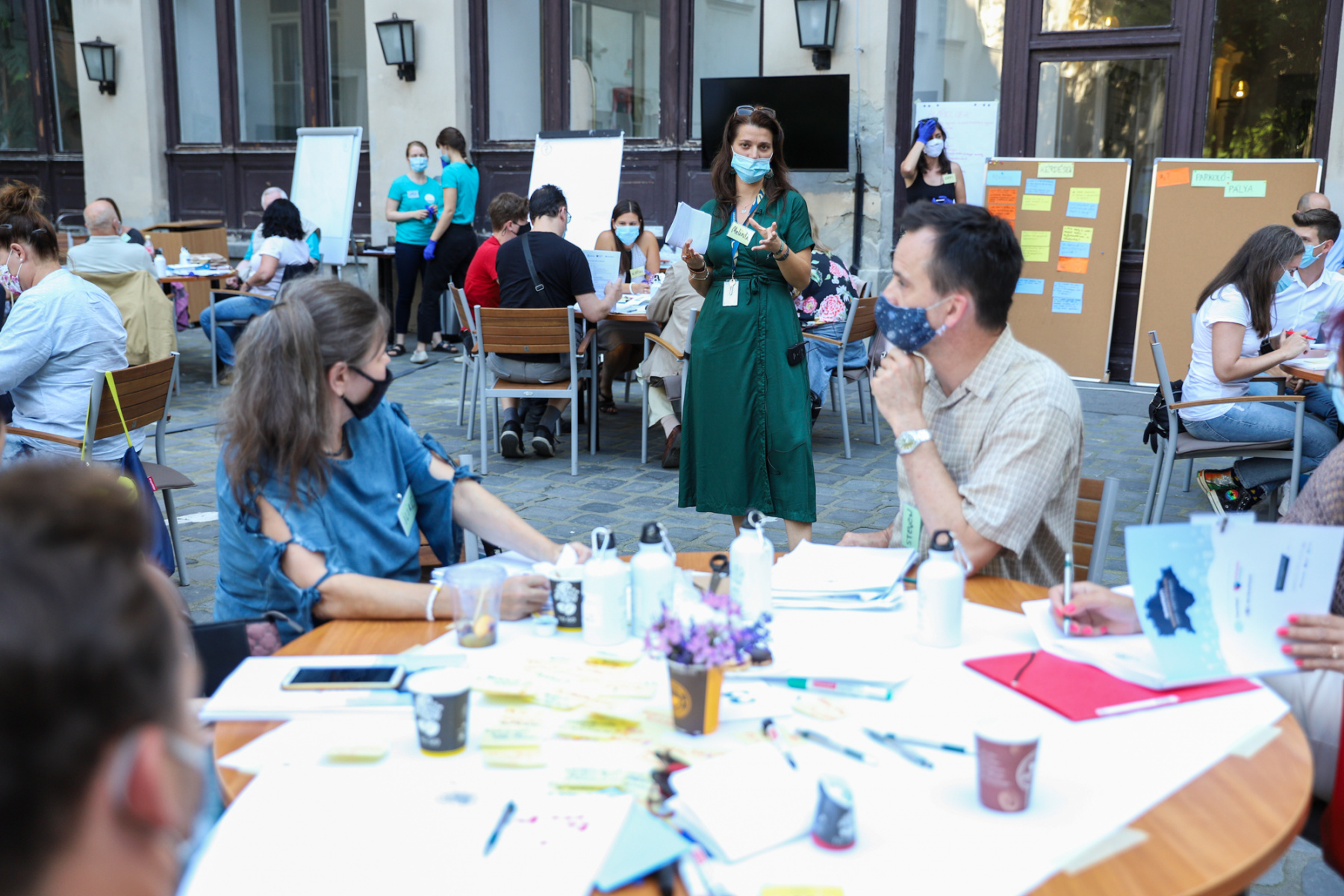
© Ildiko Fulop / DemNet Hungary. On the picture: Melinda Varfi giving instructions.
Climate strategy is a long term strategy, so there will be a new city council at some point. Is there any guarantee that the decisions that are made now, will be continued when there is a new council?
Of course this is difficult to predict, but Bördős is hopeful: “I hope that whoever governs the city will respect the voices of its citizens, and thus will respect the outcome of the citizens’ assembly. Our mayor is running for prime minister, so there is a chance that he will leave next year. But what is more important: citizens’ assemblies should go beyond party politics. So ideally both the governing and opposing parties should support Citizens’ Assemblies. As DemNet we strongly believe that all political parties and every citizen should be able to consider these as a forum, despite their political preferences.”
Every citizen should consider a citizens´ assembly as their forum, despite their political preferences.
Was the outcome considered legitimate by the other citizens of Budapest?
“Not many questioned the legitimacy of the assembly, which was an achievement in itself. We did everything by the book. The Sortion Foundation facilitated the selection and helped us every step of the way. So did Involve, as well as Marcin Gerwin, who gave us a workshop and to whom we owe a lot of insights, especially because in some ways Hungary and Poland are similar. Neither country is very climate-minded on a national level, but more and more of their cities seem to think: if the national government won’t tackle climate change, we will. I think the future lies with the cities, they will determine to a great extent what will happen. So don’t underestimate those local assemblies.”
I think the future lies with the cities, they will determine to a great extent what will happen. So don’t underestimate those local assemblies.
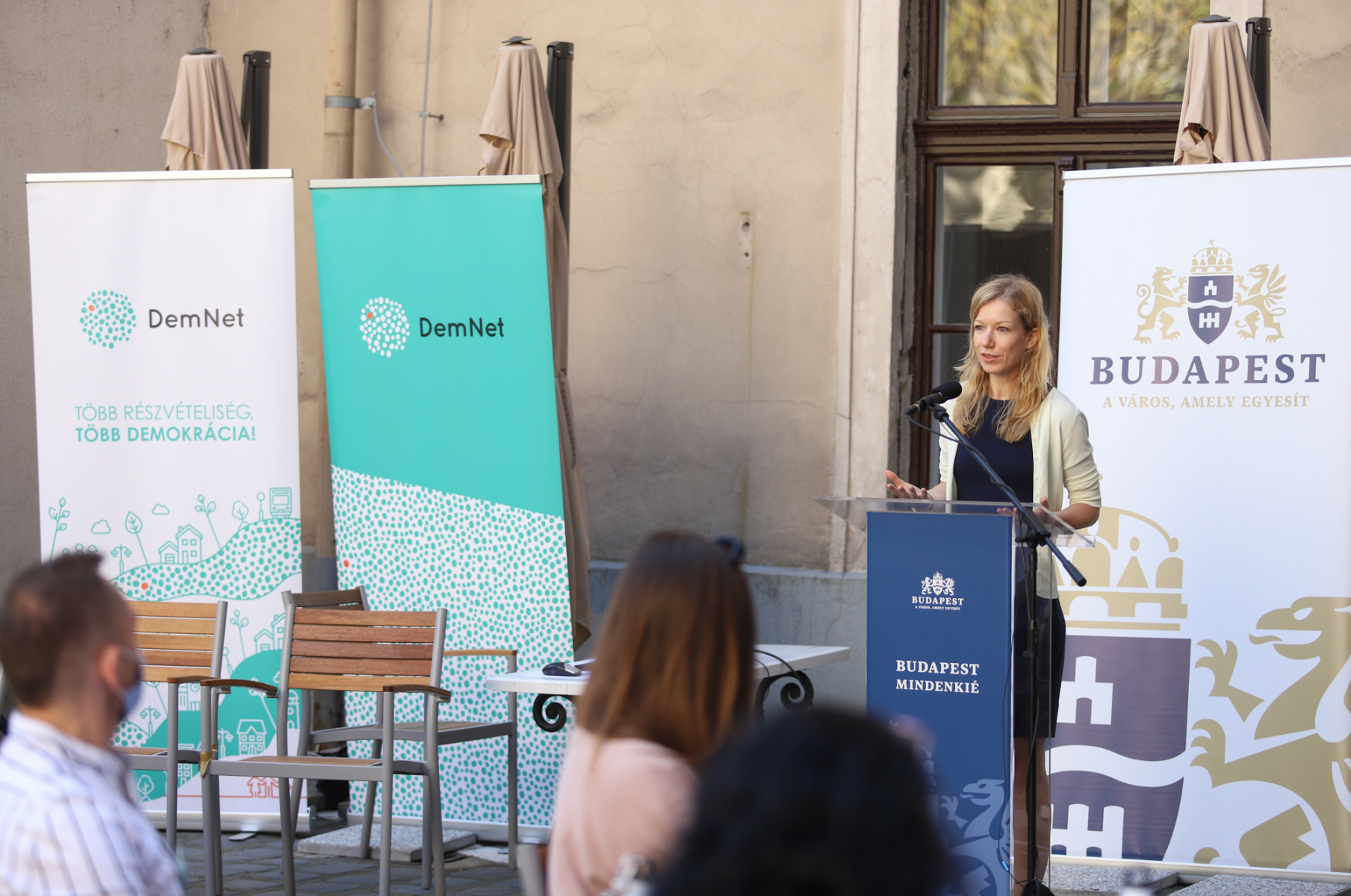
© Ildiko Fulop / DemNet Hungary. On the picture: Éva Bödős welcoming the participants.
What does this climate citizens’ assembly mean for climate and for democracy in Hungary?
“We very much hope it will prove to be the first step of a very long road,” says Bördős, “that we will see more citizens’ assemblies in Hungary, that people will spread the word and urge others to ask for more local citizens’ assemblies as well. Fortunately, we received funding from the European Climate Foundation to start climate assemblies in two more cities. We are currently preparing the first one, in Miskolc, in northern Hungary.
This is important, because there is not enough talk about climate change, people need to understand what is going on and how we can fight it. What annoys me is that big corporations and many politicians try to make citizens wholly responsible for fighting climate change. Of course individual people have to make changes to their lives, but we need political will for the fundamental changes. The world will not be able to mitigate climate change unless politicians get on board. In the end it’s their job to implement the necessary measures. So what we try to achieve is sending the message that fighting climate change requires systemic change, that politicians have to act and that people will support them.
Climate change is ofcourse one of the most crucial issues of our time, but there are other issues that are dividing society and where a citizens’ assembly could help. I would love to see a political party or certain political forces promise the Hungarian citizens that if they get elected, they will hold a citizens’ assembly every year on a fundamental topic that affects us all, to hear what everyday people think about it. For instance, on how we deal with our past, or what direction our foreign policy should take. Personally I would love to see a national citizens’ assembly on the tax system. The tax system is such a fundamental element of our democracy: who do you collect money from and what do you spend it on? Citizens should have a say in how the government collects revenue and spends public money.”
Varfi adds: “On a local level, the impact is mainly behavioural change. People suddenly realize that their opinion matters and that ‘leadership culture’ can change. The current culture stems from a long history in Hungary of autocratic governments and dictatorship, in which people’s opinions don’t matter and they just have to execute whatever has been decided for them on the top. This needs to change, but such cultural change takes time. That is why this behavioral change is so important. It is not a direct effect, it is not why you start a citizens assembly. Still, it is so important that people discover what it means to live in a democracy, and experience that they actually have power. To be an active citizen you need to take leadership in your own hands, and not just expect leadership to come from the top. Understanding that is very valuable.”
“I studied sustainability in Sweden,” Varfi continues, “and ever since I realise that participatory methods and dialogue are also a part of sustainability. I don’t believe in a top down structure anymore. You need to involve the people that you are making policy for, otherwise chances are that nobody benefits, because the policy is flawed in structure and design.”
Bördős agrees and elaborates: “The purpose of a citizens’ assembly is not for people to write a piece of legislation or to agree on something highly technical, but to agree on broader, more fundamental issues, to find tracks to follow. A citizens’ assembly enables a dialogue both between the people, and between the people and politics. It’s a dialogue on different levels, which boosts social understanding and social cohesion. It’s the key to strong democracies.”
A citizens’ assembly enables dialogue both between people, and between people and politics.
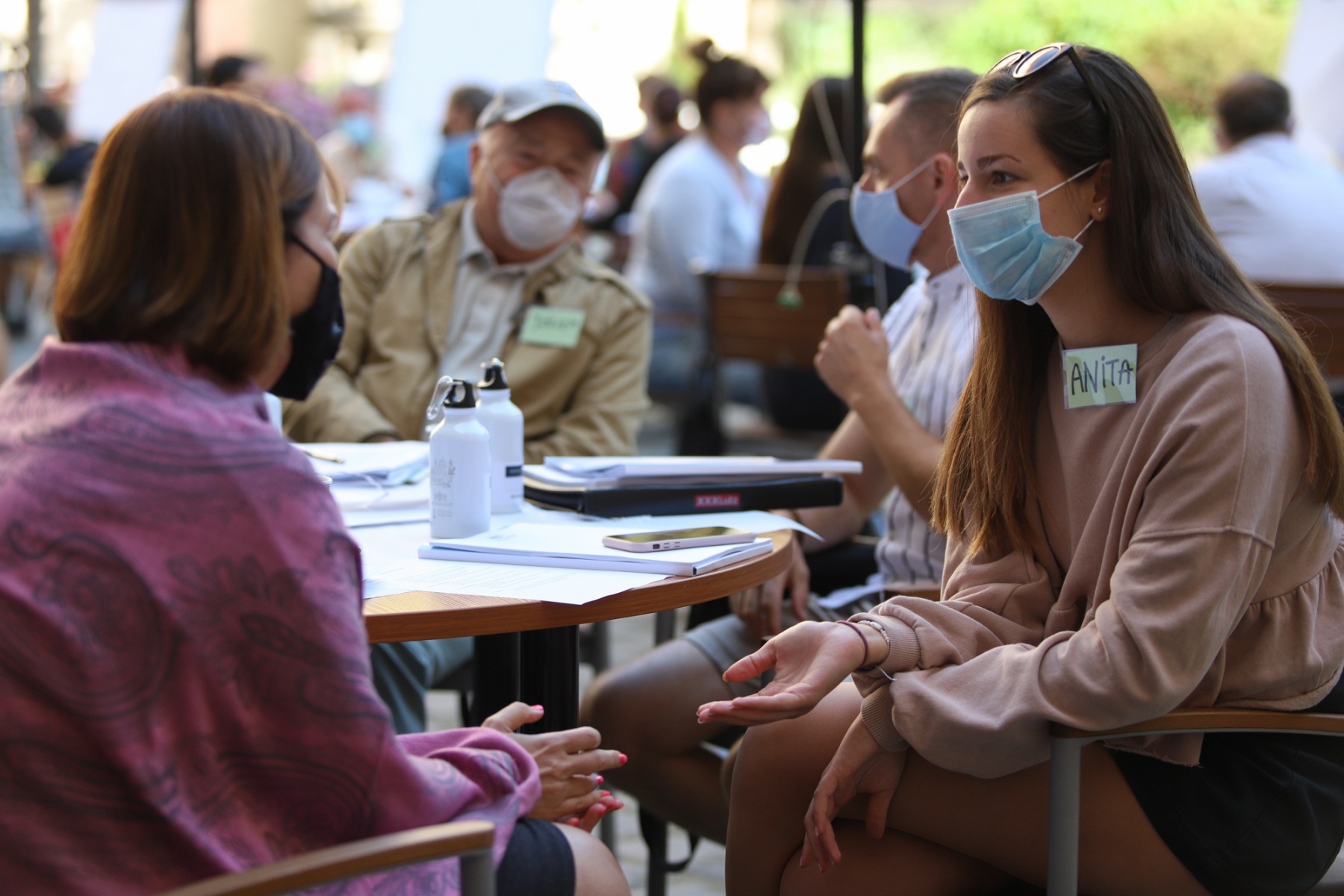
© Ildiko Fulop / DemNet Hungary. On the picture: participants discussing.
If you want to know more about this subject, check out our online knowledge platform ‘Climate Citizens’ Assemblies’ and join us for our coming LIVECAST session ‘Depolarizing Climate Change’.









